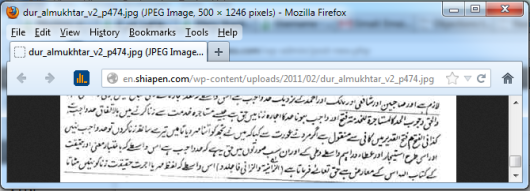Shiapen (previously known as answering-ansar) says:
Eighth Example of Sunni morality – The Permissibility to pay a woman for sex, without fear of Islamic punishment
We read in Dur al-Mukhthar, Volume 2, Page 474 (a compilation of the great Fatwas of Imam Abu Hanifa) as follows:
We read in Fathul Qadeer that if a man informs a woman that he is paying her for sex then he cannot be subject to any manner of Islamic penalty.
Dur al-Mukhtar, Volume 2, page 474
The right translation is as following:
فتح القدیر میں کافی سے منقول ہے اگر مرد نے عورت سے کہا کہ میں نے تجھ کو اتنا مہر دیا، میں تیرے ساتھ زنا کروں تو حد واجب نہیں
It is narrated in Fathul Qadir from kafi that if a man tells a woman that I give you such amount of dowry in return for zina, then hadd is not wajib.
First of all, here the word dowry is used, secondly translating ‘hadd wajib nahi’ as ‘he can not be subject to any manner of Islamic penalty’ is highly misleading. Because if hadd is not wajib, it doesn’t mean that tazeer can also not be given, and tazeer is also an Islamic penalty. Shiapen aka Answering-Ansar is very fond of mistranslating such important points to make its articles ‘more appealing’ to the readers.
Note : The book ‘Kafi’ mentioned here is not the famous hadith book of Shias.
Secondly after mentioning what is written in fathul qadeer, the author of the book, durr al Mukhtar, says:
ان سب صورتوں میں حق یہ ہے کہ حد واجب ہے اس واسطے کہ باعتبار معنی اور حقیقت کے کتاب اللہ اس کے معارض ہے ، حق تعالٰی فرماتا ہے الزانية والزاني فاجلدوا
In all these cases, the right thing is that hadd is wajib because in its meaning and in its reality, it is against the Book of Allah, Almighty Allah says : The woman and the man guilty of illegal sexual intercourse, flog each of them (Quran 24:2)
Shiapen aka Answering-Ansar never bothered to mention this in its article, while it is written in the very next line. But how can a people, whose aim is to misguide others care, about these things?




